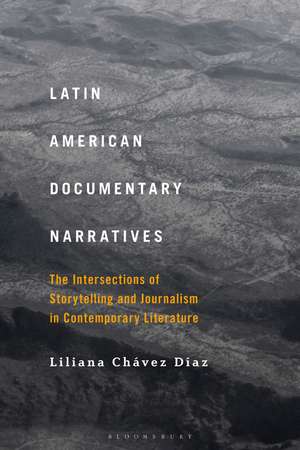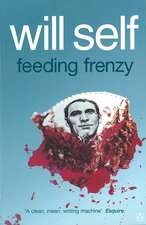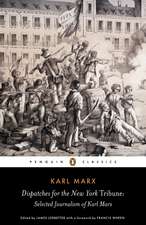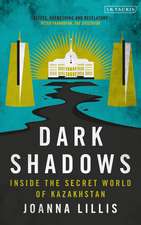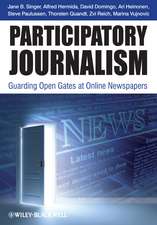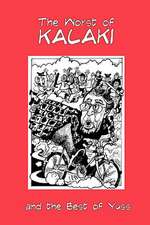Latin American Documentary Narratives: The Intersections of Storytelling and Journalism in Contemporary Literature
Autor Dr. Liliana Chávez Díazen Limba Engleză Paperback – 28 iun 2023
| Toate formatele și edițiile | Preț | Express |
|---|---|---|
| Paperback (1) | 192.82 lei 6-8 săpt. | |
| Bloomsbury Publishing – 28 iun 2023 | 192.82 lei 6-8 săpt. | |
| Hardback (1) | 570.28 lei 6-8 săpt. | |
| Bloomsbury Publishing – dec 2021 | 570.28 lei 6-8 săpt. |
Preț: 192.82 lei
Preț vechi: 250.15 lei
-23% Nou
Puncte Express: 289
Preț estimativ în valută:
36.90€ • 38.62$ • 30.71£
36.90€ • 38.62$ • 30.71£
Carte tipărită la comandă
Livrare economică 31 martie-14 aprilie
Preluare comenzi: 021 569.72.76
Specificații
ISBN-13: 9781501376061
ISBN-10: 1501376063
Pagini: 308
Ilustrații: 10 bw illus
Dimensiuni: 152 x 229 x 25 mm
Greutate: 0.41 kg
Editura: Bloomsbury Publishing
Colecția Bloomsbury Academic
Locul publicării:New York, United States
ISBN-10: 1501376063
Pagini: 308
Ilustrații: 10 bw illus
Dimensiuni: 152 x 229 x 25 mm
Greutate: 0.41 kg
Editura: Bloomsbury Publishing
Colecția Bloomsbury Academic
Locul publicării:New York, United States
Caracteristici
Literary journalism is a field of increasing interest in Latin American literary and media studies, but very little has been written on the topic in English so far
Notă biografică
Liliana Chávez Díaz is Lecturer in Latin American Studies at the University of St Andrews, Scotland, and author of Viajar sola: identidad y experiencia de viaje en autoras hispanoamericanas (2020). She has been a journalist for over ten years, focusing on art, culture, and science.
Cuprins
FiguresPrefaceForeword by Steven Boldy, University of Cambridge, UKAcknowledgementsIntroductionPart I. Courage1. Naming the Real2. Publishing to SurvivePart II. Belonging3. Out of Place4. A Certain Effect of TruthPart III. Listening5. Local Conversations in Globalized Times6. Being ThereConclusionAppendixInterview 1. Cristian Alarcón (La Unión, Chile, 1970)Interview 2. Martín Caparrós (Buenos Aires, Argentina, 1957)Interview 3. Arturo Fontaine (Santiago de Chile, 1952)Interview 4. Francisco Goldman (Boston, United States, 1954)Interview 5. Leila Guerriero (Junín, Argentina, 1967)Interview 6. Elena Poniatowska (Paris, France, 1932)Interview 7. Santiago Roncagliolo (Lima, Perú, 1975)Interview 8. Juan Villoro (Ciudad de México, 1956)ReferencesIndex
Recenzii
A brave and illuminating study of Latin American documentary narrative and journalism as story-telling. Focussing on true stories told by a first-person witness, Chavez, a journalist by training, makes an incisive contribution to our understanding and appreciation of this distinctive genre. She hones in on the writing style and motivation of eight celebrated literary-journalists, including Gabriel García Márquez and Elena Poniatowska, to underscore the commitment and ethical choices made by these truth-seeking authors and, in some cases, the heavy price they had to pay. Makes for compelling reading.
Latin American Documentary Narratives is by far the richest and best-informed state-of-the-art account of the vast body of contemporary Latin American nonfiction narratives. With an insider's experience of journalism as an institution and as textual practice and the rigor of a trained literary scholar, Liliana Chávez Díaz has written a field-defining book that will have immediate and long-lasting impact.
Part literary criticism, part metajournalism, this book takes the reader on a fascinating journey through Latin America's documentative non/fiction of the past half century. Describing a generic hall of mirrors, where fiction and nonfiction endlessly reflect and absorb each other's image, Chávez Díaz interrogates the "ethical pitfalls" a literary journalist confronts as mediator between a disenfranchised informant and a narrative-hungry reader.
Latin American Documentary Narratives is by far the richest and best-informed state-of-the-art account of the vast body of contemporary Latin American nonfiction narratives. With an insider's experience of journalism as an institution and as textual practice and the rigor of a trained literary scholar, Liliana Chávez Díaz has written a field-defining book that will have immediate and long-lasting impact.
Part literary criticism, part metajournalism, this book takes the reader on a fascinating journey through Latin America's documentative non/fiction of the past half century. Describing a generic hall of mirrors, where fiction and nonfiction endlessly reflect and absorb each other's image, Chávez Díaz interrogates the "ethical pitfalls" a literary journalist confronts as mediator between a disenfranchised informant and a narrative-hungry reader.
